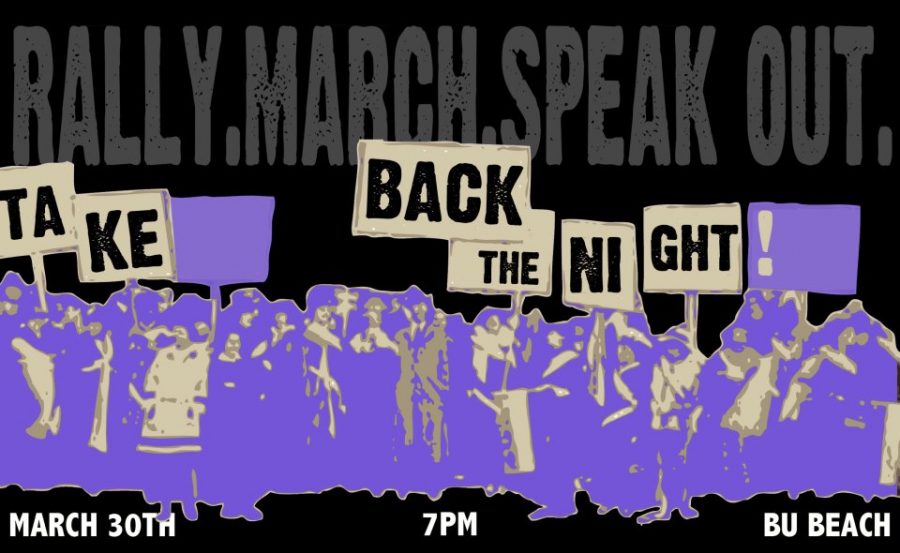On Wednesday, October 7, Take Back the Night, the Women’s Center and other allied organizations on campus came together to host the “It’s on Us: Ending Rape Myths” panel. The discussion began with Chelsey Puzzanghero ‘16, an intern for the Women’s Center, introducing the faculty and students who were addressing five common rape myths: “It wasn’t rape, you just regret having sex with him;” “It doesn’t happen to men;” “It wasn’t rape if they didn’t fight back;” “It wasn’t rape if they were flirting;” and “It wasn’t rape if they’d had consensual sex in the past.”
Dr. Amanda Konradi, who has an extensive background in rape survivor’s studies, spoke first on the myth “It wasn’t rape, you just regret having sex with him.” Dr. Konradi explained that the basis of this myth is that women make false claims about rape. In debunking this myth, Dr. Konradi said that research on false reporting shows that it is not a common phenomenon, and that the implicit assumption in saying that women make false claims is that women “ are inherently vindictive and irrational.” Dr. Konradi also emphasized that sexual assault cases may be dropped for various reasons, so the fact that a case is dropped is not indicative of its falsehood.
Dr. Patrick Brugh, German and gender studies professor, addressed the second rape myth, “It doesn’t happen to men.” Dr. Brugh explained that while men are almost exclusively portrayed as and believed to be the perpetrators of sexual violence, men are victims of rape just as women are. Locally, Dr. Brugh said, that one in 33 men have experienced attempted or completed rape, and that the proportion increases significantly among college students. “With that statistic,” Dr. Brugh said, “the number [of rape survivors] on this campus would be 75.” Dr. Brugh also explained that the perpetrators of sexual crimes against men are often heterosexual men, indicating that an underlying problem with this issue is the definition of masculinity. Dr. Brugh suggests that, “we have to come up with a new definition of masculinity that does not involve power and control.”
The next myth discussed was, “It wasn’t rape if they didn’t fight back,” which Ms. Melissa Lees, Loyola’s sexual violence prevention and education coordinator, elaborated on “The myth is that you have to have a broken bone, you have to be covered in blood, your clothes have to be ripped, your hair has to be disheveled, or it wasn’t real,” Ms. Lees said. She explained that there are three common responses to trauma: fight, flight, or freeze. Rape survivors may freeze for a number of reasons, including the presence of a weapon, the fear of strangulation, the fear of waking children who may be asleep in the house, or the shock of knowing the perpetrator. “We can end this,” Ms. Lees said. “Just believe them. We can all help end some of the rape myths that are out there.”
The fourth myth, “It wasn’t rape if they were flirting,” was addressed by Ryan Blake ‘16. “The bottom line,” Blake said, “is that flirting does not constitute consent.” “The bottom line,” Blake said, “is that flirting does not constitute consent.” He went on to address a dub-myth of women “not knowing any better,” to which Blake retorted, “why does she have to know any better?” Blake said that when it comes to perpetrators’ mentalities regarding sexual violence, “this is our reality, but we are all responsible for shifting it.”
Emily Brookshire ‘16, co-president of Take Back the Night, addressed the final rape myth, “It wasn’t rape if they’d had consensual sex in the past,” by telling the story of a friend. The person she knew told her boyfriend that she didn’t want to have sex after they had previously. Her boyfriend responded, “Don’t you love me?” and then forced her to have sex with him for the duration of their two-year relationship. Brookshire emphasized a point previously made by Ms. Lees, stating that two-thirds of rapists are acquaintances, and that “when you say ‘yes,’ you’re saying yes to that one night, that one encounter.” She urged listeners to be aware of the warning signs and red flags in relationships and friends’ relationships and to speak up if they become present. “When you see this,” Brookshire says, “I hope you say something. I hope you think of [my friend].”
There are many opportunities and organizations on campus for interested students to get involved with regarding this issue. GreenDot training teaches students to be responsible bystanders, and Escalation training leads students to spot red flags in domestic relationships. Take Back the Night and the Women’s Center are also two organizations on campus that work with sexual violence, and that are always looking for students to get involved.










































































































